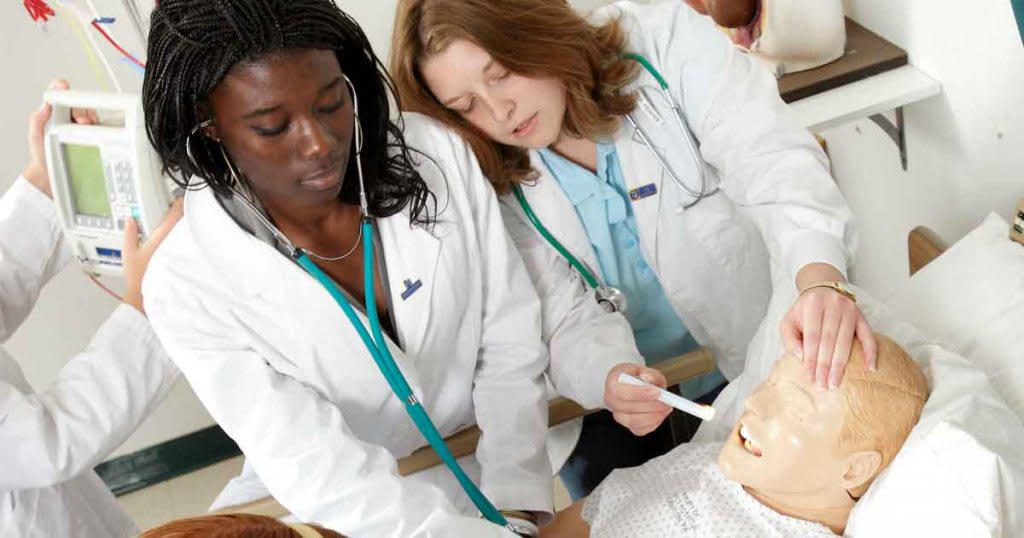What Can I Do with My Nursing Degree? Rewarding Nursing Career Options
Each blog post is dated and contains accurate information as of that date. Certain information may have changed since the blog post publication date. If you would like to confirm the current accuracy of blog information, please visit our ABSN overview page or contact admissions at (866) 885-6337.

Part of your vision for your future career is clear: You want to become a nurse. But when you think of the setting of your dream job, the mental image is still a little fuzzy.
As it turns out, once you earn your Bachelor of Science in Nursing (BSN) degree, you open yourself up to a diverse range of career options. There are many specializations and career paths that you will be able to pursue within a hospital setting, but if working in a hospital does not appeal to your personality type, you will find plenty of career opportunities in different workplace environments.
No matter which option you choose, Misericordia’s 16-month ABSN program can help you get there — sooner. Here are 10 options in and outside the hospital that become viable career choices once you earn your BSN.
Advantages of a BSN
But before we dive into our list of career choices, it’s helpful to understand the advantages of a BSN degree to your future nursing career.
More Marketability
The healthcare landscape continues to grow more complex, leading to more demand for nursing professionals who understand it. The profession is slated to grow faster than the average for all other occupations through 2028, according to the Bureau of Labor Statistics.
Nurses who earn their BSN are more highly sought after by healthcare employers because research has shown that having better educated nurses improves patient outcomes and decreases patient mortality, according to the AACN. A BSN also sets you up to work at a hospital with Magnet recognition, where hiring higher educated nurses is a major focus.
This push for a BSN means great news for your future career: By earning a Bachelor of Science in Nursing, you set yourself up to become an in-demand candidate for many nursing jobs soon after graduation.
More Earning Potential
By earning a BSN, you set yourself up nicely for an entry-level position at a comfortable starting salary: the average annual salary for a BSN-educated nurse in Pennsylvania is roughly $83,221, according to ZipRecruiter. But with a BSN, more advanced career options can eventually become available to you through graduate-level study. A BSN can become a pathway for the advanced degrees required for such higher-paying nursing roles as:
- Nurse anesthetist: $183,580 average starting salary*
- Nurse midwife: $111,130 average starting salary*
- Nurse practitioner: $111,680 average starting salary*
- Nurse administrator/medical and health services manager: $104,280 average starting salary*
*Source: 2020 U.S. Department of Labor, Bureau of Labor Statistics
Nursing Career FAQs
Pursuing a nursing career is filled with choices, as you apply your degree to access a wide range of employment opportunities. With so many choices to make, though, you must have some questions about nursing as a career path and whether it’s right for you. Below, we explore some of the frequently asked questions people have about nursing careers and provide answers that will allow you to feel confident in your decisions.

What Jobs Can You Get with a Bachelor’s Degree in Nursing?
Where can nurses work? The first answer that comes to mind for most is a clinic or hospital setting, but that isn’t the only place nurses work. After earning a BSN, you set yourself up for myriad career options both inside and outside the hospital.
Nursing jobs inside the hospital
Most jobs for nurses with a BSN involve some sort of hospital setting: Of the more than 3.1 million registered nurses who worked in the U.S. in 2019, 60 percent worked at state, local and private hospitals, according to the Bureau of Labor Statistics.
But not all nursing roles within the hospital are created equal. If you’re considering a nursing career in a hospital setting, you’ll find a variety of nursing specialties, many of which you’ll get to experience as a Misericordia ABSN student. Each comes with an assortment of hours and duties best suited to different lifestyles and personality types.
Medical-surgical nurse
Chances are, if you’ve ever been admitted to or visited someone in a hospital, you’ve had experience with this type of nurse: It is the largest nursing specialty in the U.S., according to the Academy of Medical-Surgical Nurses (AMSN).
Medical-surgical nurses create treatment plans, administer medications, provide care, and document everything for acutely ill patients and/or patients recovering from surgery. Because you’ll be caring for patients with all kinds of ailments, this type of nursing requires a vast knowledge of body systems and illnesses as well as high-level critical thinking and management skills.
Critical care/ICU nurse
Nurses who work in the intensive care unit (or the neonatal or pediatric intensive care unit for patients under the age of 17) treat patients who require high-acuity care. Their shifts are very structured, as they are often working with patients who require intubation and/or the use of a ventilator or medication drip. For this reason, this specialty is for you if you’re detail-oriented, organized and enjoy developing relationships with patients and their families.

Emergency room nurse
While not every day is like a plotline from the classic medical drama “ER,” working as a nurse in the emergency room does offer a great opportunity for adrenaline seekers and those who love organized chaos. Your patients will run the gamut, ranging from those who suffer from fractured bones to strokes and gunshot wounds. Your primary role will be to triage them in order of life-threatening priority.
Labor and delivery nurse
Working as a nurse on the labor and delivery unit, you’ll get to experience the miracle of childbirth nearly every shift. Your job duties will include coaching mothers through the birthing process during active labor and preparing new parents to take their children home.
While this type of nursing is mostly joyful, you have to be ready for any birthing complications, so excellent patience, empathy and communication skills as well as the ability to remain calm under pressure are vital.
Operating room nurse/perioperative or scrub nurse
You’ve likely met this type of nurse if you’ve ever gone in for any kind of inpatient or outpatient medical procedure. Operating room nurses work one-on-one with patients to get them through surgery from preparation to recovery. This type of nursing is great if you like instant gratification, as you’ll often work with medical professionals across a variety of specialties to address a specific problem and see the immediate results of your work.
These are far from all the types of nursing roles you’ll find in a hospital setting. Other nursing specialties to consider include:
- Rheumatology
- Neurology
- Oncology
- Post-anesthesia care
- Telemetry
- Cardiovascular
- Radiology
Non-bedside RN jobs
A hospital or a doctor’s office isn’t the only place you can apply your BSN to your career. If you’re open to working independently in a variety of workplace settings, you can use your nursing degree to find a non-bedside RN job that allows you to flex your nursing muscles in different ways.
Where else can nurses work? Consider these other nursing jobs outside the hospital.
Travel nurse
Why not travel to new and exciting places while building up your nursing resume? Travel nursing allows you to do just that. If you’re interested in pursuing this career path, first start by contacting a travel nurse staffing agency, which can help you land a contract ranging from a couple of months to a couple of years. You’ll likely need a couple of years of experience in your specialty area before you can expect to accept your first contract, though, as healthcare facilities who hire travel nurses prefer candidates who can hit the ground running.
Nurse case manager
Are you interested in developing long-term relationships with your patients? A nurse case manager oversees extended care plans for patients who require ongoing medical care, such as geriatric or cancer patients. This person coordinates doctor’s visits and surgeries, monitors medication usage as well as educates and acts as emotional support for patients and their caregivers. You can apply for this role in a wide range of settings: hospitals, clinics, private practice, nursing homes, hospice care, or even home healthcare companies.
Home health nurse
Do prefer to work independently in a variety of environments? If so, then home health nursing may be a career option for you to consider. Working for either a hospital or an independent agency, you’ll make house calls to treat people recently discharged from the hospital or suffering from chronic conditions. You’ll often act as a liaison between patients and their doctors, teaching patients and their family how to manage their care needs while offering recommendations to physicians for their next steps in care.
Public health nurse
Think of this nursing role as being a community healthcare ambassador. Rather than care for people when they’re sick, you’ll go into communities to help people improve their health and prevent disease. For example, you may work to offer screening services, immunizations or provide prenatal/baby care or give presentations on health-related topics in community settings.
Informatics nurse
Do you love technical troubleshooting as much as you love caring for patients at the bedside? A career as an informatics nurse combines both. In this role, you’ll create systems to improve patient care, using tools like electronic medical records or computer code to monitor the effectiveness of medical equipment and train clinical staff on how to use new devices.
It’s a high-demand path, too: as many as 70,000 nursing informatics specialists/analysts may be needed in the next five years in hospitals, consulting firms, universities, and corporations.
Other non-bedside jobs for nurses with a BSN to consider include:
- School nurse
- Flight nurse
- Nurse risk manager
- Nurse recruiter
- Clinical research nurse
- Nurse writer
- Forensic nurse
BSN: A Solid Start for Any Nursing Career
What can you do with your nursing degree? Nursing is an in-demand career path not limited to the hospital setting, and your BSN from Misericordia University can take your nursing career wherever you want it to go. Whether you want to work as a nurse in a hospital emergency room or as a legal nurse consultant, our rigorous, 16-month curriculum aims to ready you with the key nursing skills and knowledge needed to succeed.
Contact one of our dedicated admissions counselors today to start putting your nursing future into clearer focus.
